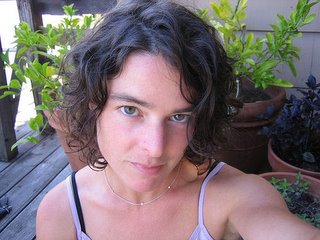heart outside body
When I first came across this phrase as a description of parenting, I think it was here (but I can't remember for certain), I found it a little excessive. This was before I was pregnant, or possibly right after I had found out I was pregnant, and I very much subscribed to the philosophy of discrete identities. A notion of myself as a whole entity, a discrete being clearly differentiated from others--be they my family, my husband or a possible child. I felt that the culture-wide identification of parents with children--parents whose identities are subsumed in their children, whose entire existence is wrapped up in their child, and children wholly dependent on their parents--baffling and somewhat off-putting. It was not for me. If I were to go through pregnancy, bear a child, and then raise one, it would all be accomplished with my self clearly differentiated from this child. In pregnancy, the harshest version of this line of thinking had me making Mychal swear that should anything go wrong during the pregnancy or the delivery that the doctors would save me first. Me first! was my overwhelming thought. My thoughts for after the pregnancy involved returning to work immediately, a child in nearly full-time childcare, who marched merrily along towards independence and activities that did not involve me.
All of this thinking went out the window, not quite during the pregnancy, but almost immediately after Axel's birth. Certainly within the first two hours of his life, as I waited alone for the nurses to bring him back to me after having whisked him away about a minute after he was born. I waited, getting increasingly pissed off, thinking nasty things about the incompetent nurses who were keeping me from this newborn, until Mychal showed up to tell me where they'd taken him. Of course, I immediately got up from the bed and ran to the nursery (it took my nurse about half an hour to find me there).
Now, fully sixteen months into Axel's life, I understand the phrase "my heart outside my body" differently. Having a child is having your heart suspended out there in the open, vulnerable, exposed to the elements and, at times, fully beyond your reach. My heart, as the seat of my emotions, is no longer protected within me; nor is it exclusively of me, having exceeded my own physical boundaries, it bops along to its own beat in the world at large.
Axel moves about in the world; he has my heart in his hands, and he is oblivious to that. He can be frivolous with it, as only a toddler can be: he treats himself and the world with absolute disregard for the fragility of life. With the at times brutal single-mindedness of a toddler, he pursues the world, reckless with his body as his knowledge of consequences is limited. In this reckless pursuit, throwing himself fearlessly at the world, Axel exposes my vulnerability.
All of this thinking went out the window, not quite during the pregnancy, but almost immediately after Axel's birth. Certainly within the first two hours of his life, as I waited alone for the nurses to bring him back to me after having whisked him away about a minute after he was born. I waited, getting increasingly pissed off, thinking nasty things about the incompetent nurses who were keeping me from this newborn, until Mychal showed up to tell me where they'd taken him. Of course, I immediately got up from the bed and ran to the nursery (it took my nurse about half an hour to find me there).
Now, fully sixteen months into Axel's life, I understand the phrase "my heart outside my body" differently. Having a child is having your heart suspended out there in the open, vulnerable, exposed to the elements and, at times, fully beyond your reach. My heart, as the seat of my emotions, is no longer protected within me; nor is it exclusively of me, having exceeded my own physical boundaries, it bops along to its own beat in the world at large.
Axel moves about in the world; he has my heart in his hands, and he is oblivious to that. He can be frivolous with it, as only a toddler can be: he treats himself and the world with absolute disregard for the fragility of life. With the at times brutal single-mindedness of a toddler, he pursues the world, reckless with his body as his knowledge of consequences is limited. In this reckless pursuit, throwing himself fearlessly at the world, Axel exposes my vulnerability.




0 Comments:
Post a Comment
<< Home